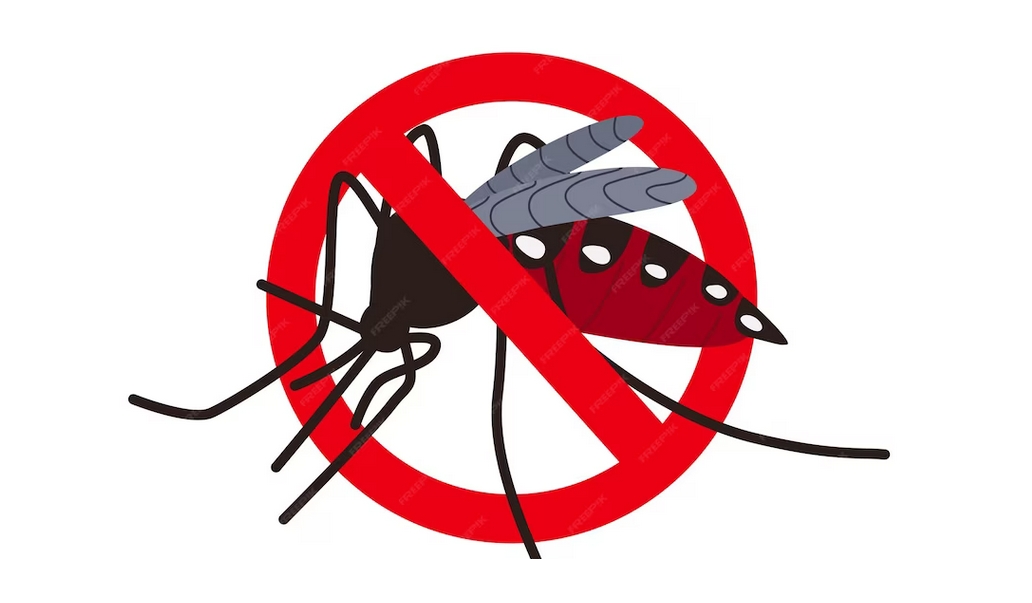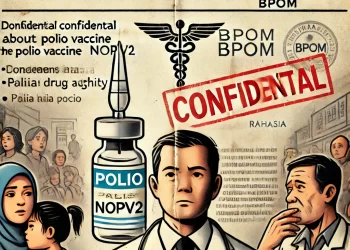Introduction
- The release of Wolbachia mosquitoes in Indonesia has become a controversial topic, sparking various opinions and concerns in the community, leading to the rejection by the Bali interim Governor’s to release 200 million of these mosquitoes in Bali.
- Although there are claims that Wolbachia mosquitoes can reduce the spread of dengue fever (DF) by up to 70-90%, not all risks are revealed, and there is ambiguity surrounding this program. Here we will discuss identified facts and some concerns related to the release of Wolbachia mosquitoes.
Background
-
- A private group called the World Mosquito Program (WMP), aiming to convince the WHO to implement the WMP program.
- WMP is funded by the Bill Gates Foundation
- It aims to develop Wolbachia bacteria as an intervention to control mosquito transmitted viruses such as dengue, Zika, and Chikungunya
- The key feature of the WMP is the intentional release of Wolbachia-infected mosquitoes in the target area that will then transmit Wolbachia into the wild Aedes mosquito population.
- Claims that this method is the only way to address dengue fever.
- Emphasis on the need for a national and global program with substantial funding (between US $4-9 billion).
Countries That Becomes The Guinea Pig
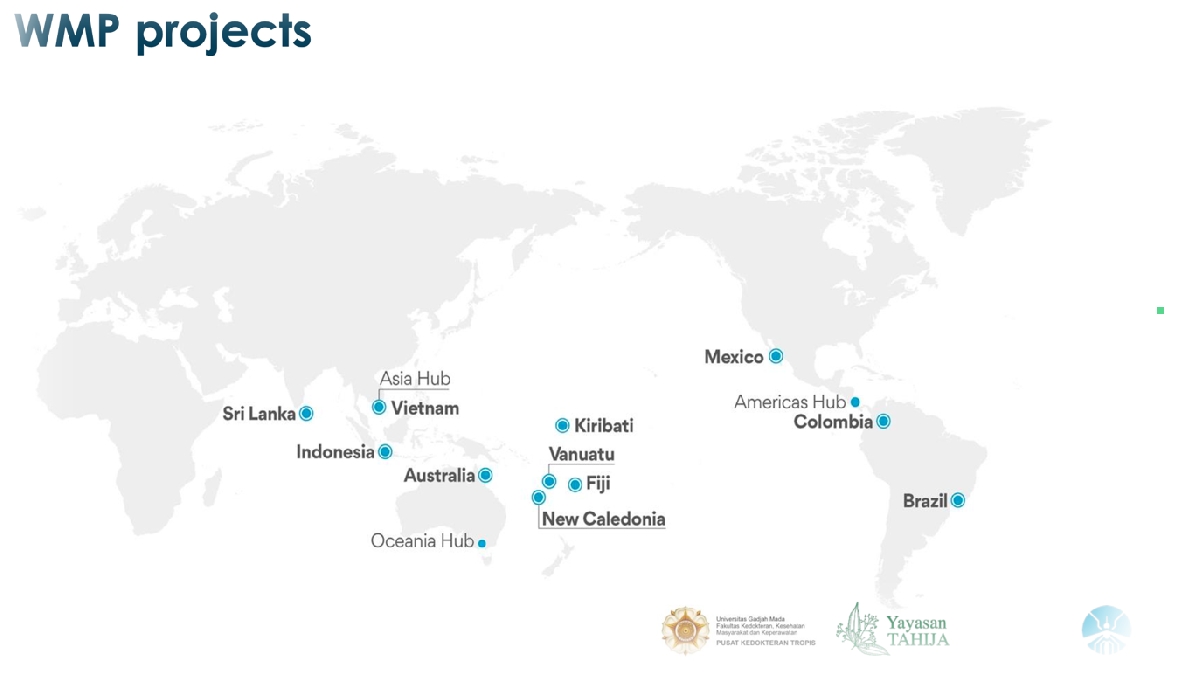
Research Publications and Bias
-
- Research results published in journals tend to favor related parties.
- Presence of bias and control in journals conducted by interested parties.
Genetically Engineered Organisms and Gene Drive
-
- Release of modified mosquitoes aims to eliminate unmodified mosquitoes, raising ethical and ecological concerns.
- These are genetically engineered organisms related to CRISPR – CAS 9 gene editing, pioneered in Australia. Mass release of modified mosquitoes represents a hidden Gene Drive.
- Gene Drive is used differently in other places, causing diseases like:
- Encephalitis (scielo.br & pubmed),
- river blindness Wolbachia-Induced Neutrophil Activation in a Mouse Model of Ocular Onchocerciasis (River Blindness),
- West Nile Virus (Control strategy for Dengue, malaria increases risk of West Nile virus);
- Zika ( The Ecologist article);
- Dengue Fever: cademic.oup.com
- Chikungunya: parasitesandvectors.biomedcentral.com
- Malaria: : nhm.ac.uk
- This is a covert Gen Drive
Escalation of Dengue Threat 300% in Sri Lanka After Mosquito Release
• In Sri Lanka, there has been an increase in mosquito larvae, leading to a threefold rise in Dengue Fever cases (66.000 cases) since the mass release of mosquitoes in 2021. : https://www.epid.gov.lk/dengue-could-be-a-silent-killer
Questions
- Scientists claim that Wolbachia bacteria are “natural”; however, Wolbachia bacteria are not naturally found in Aedes aegypti mosquitoes;
- Although Wolbachia bacteria are considered “natural,” embryos of male Wolbachia bacteria are MODIFIED with microinjections to infect adult mosquitoes with the bacteria.
- In the laboratory, scientists select which insects survive with this Wolbachia bacteria. In other words, they create a new species through genetic engineering, which they do not acknowledge in UGM’s publications, and this poses a significant problem.
- Evolutionary Pressure May Make DF Virus More Virulent: This principle states that in an environment with selection pressure, species tend to evolve to develop characteristics that make them more resistant to or resilient against that pressure.
- Evolutionary Pressure in the Context of Wolbachia Mosquitoes: By introducing Wolbachia mosquitoes into the Aedes Aegypti mosquito population, we create a new environment where evolutionary pressure can occur. Wolbachia works by infecting and altering mosquito reproduction, but mosquitoes that can withstand or resist Wolbachia effects are likely to have a selective advantage.
- Potential Changes in DF Virus: Facing evolutionary pressure, the DF virus transmitted by these mosquitoes may undergo genetic changes to survive or even become more virulent. This could happen because the pressure exerted by Wolbachia creates an environment that forces the virus to adapt for its survival. Importance of Understanding Long-Term Impact.
Dengue Fever Cases in the Last 10 Years in Indonesia
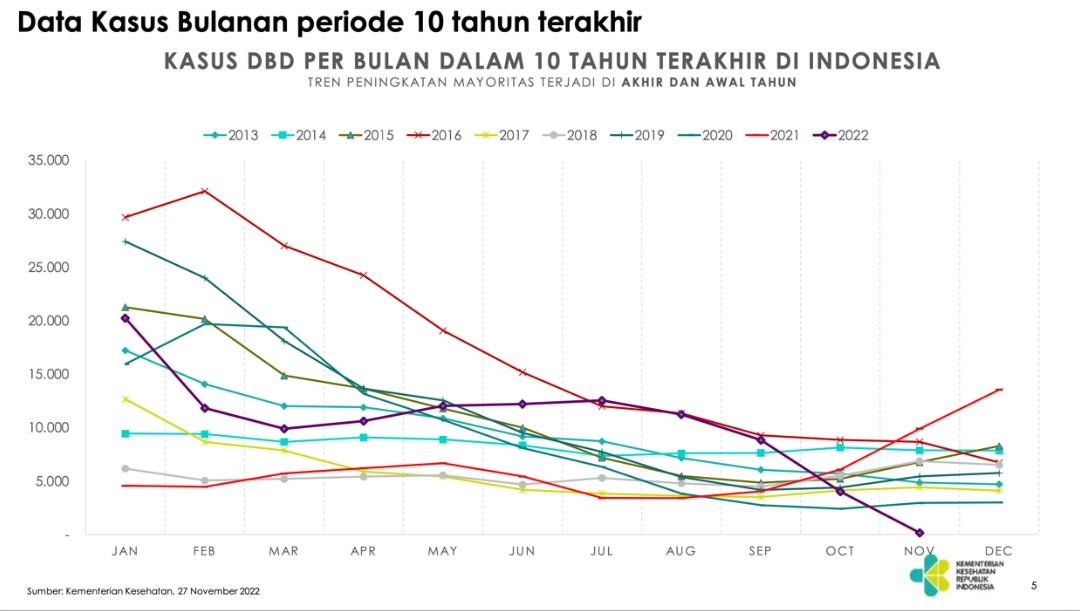
Incidence Rate (IR) and Case Fatality Rate (CFR) from 1968 – 2022 In Indonesia
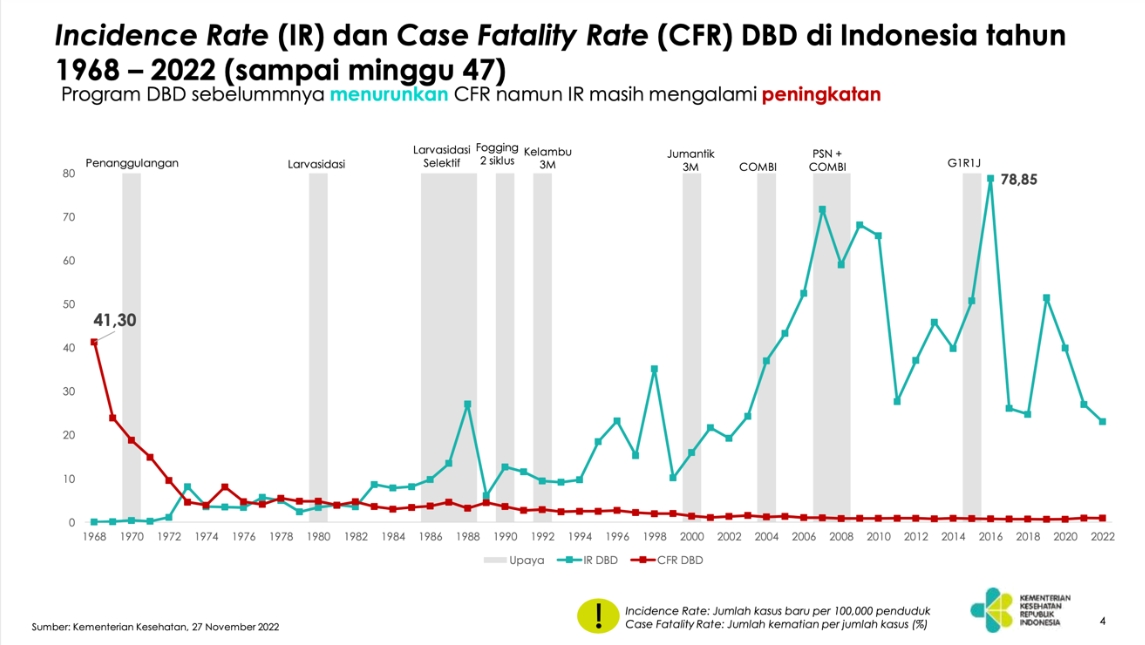
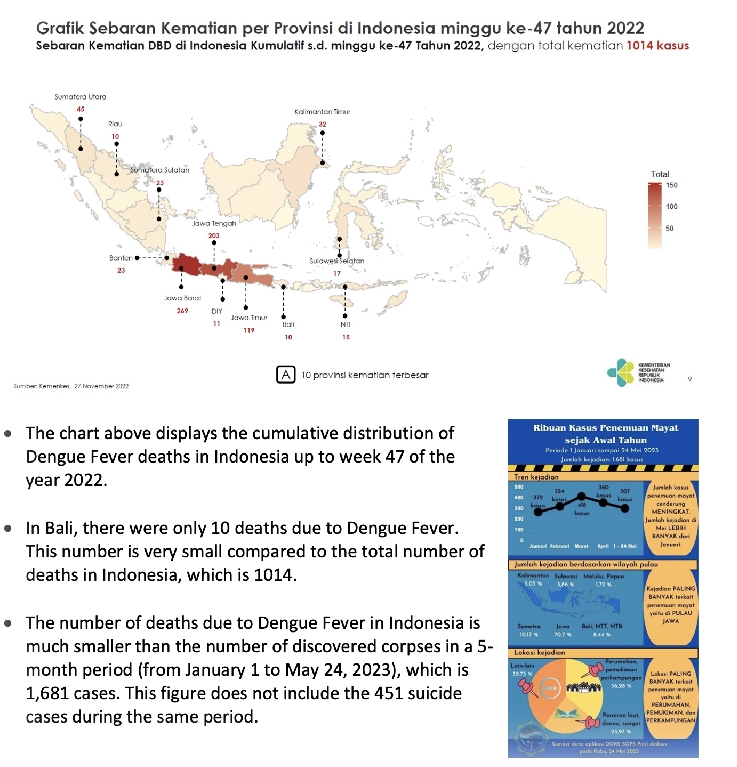
Why The Indonesian Ministry of Health is partnering with the Bill Gates Foundation to transform the healthcare in Indonesia?
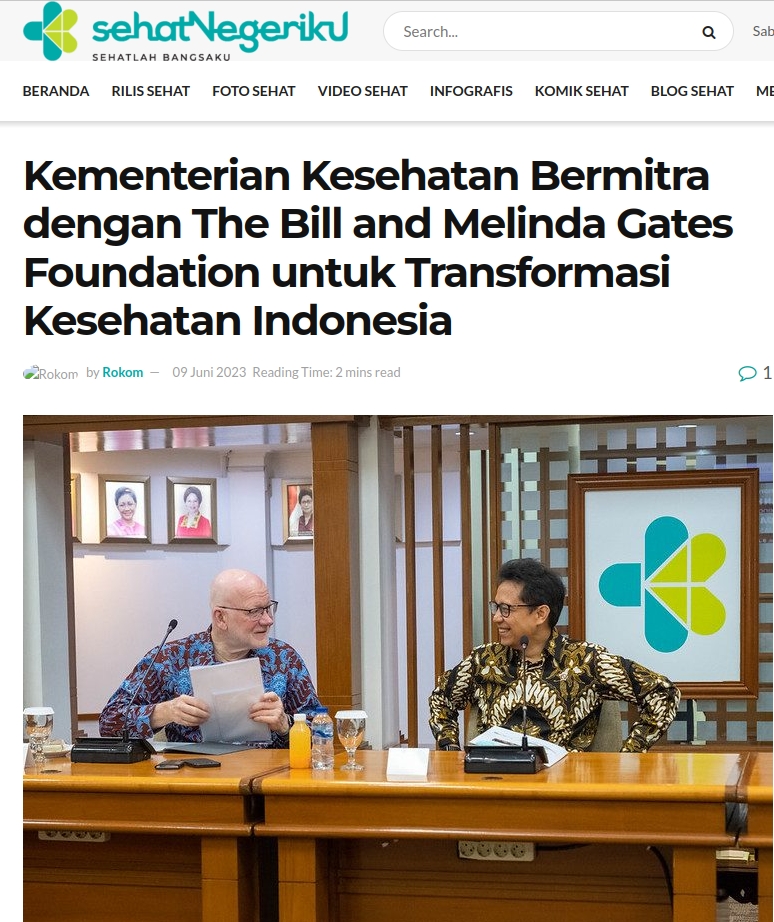
Public Concerns and Hoaxes
- In addition to the identified risks, the public is also worried about the spread of false information. Hoaxes such as human feminization or the involvement of the LGBT community, injection of a “chip” into humans by mosquitoes, and control through “Internet Protocol Transmission – IPT” raise unfounded concerns.
- It is important to only trust information that has been published in serious research. However, the public cannot be blamed for believing in these hoaxes; this is a consequence of the lack of transparency and honesty from the government and other parties involved in the mosquito program.
Legal Aspects
- The release of Wolbachia mosquitoes, as a biological agent, must be approached with caution and careful consideration. Articles 399 and 445 of the new Health Law (Law No. 17/2023) classify the release of biological agents potentially causing diseases as a criminal act, emphasizing the need for research and transparency before implementation.
- As this Wolbachia mosquito release program is based on the instructions of the Minister of Health, in our opinion, it would be advisable to report and investigate the Minister by the Police. In the police investigation process, all data and facts will be revealed, and it can be determined whether the Minister has committed a legal violation.
- If the Minister of Health cannot provide evidence that all the risks mentioned in this article have been researched, addressed, and completely ruled out, then the provision of “potentially causing an outbreak” in the criminal article is fulfilled. Everyone has the right to file a criminal report with the Police, and this article contains sufficient evidence to support such a report.
- Article 399: “Every person is prohibited from: a. disseminating materials containing causes of diseases and Health problems that potentially cause outbreaks; and/or b. disseminating biological agents causing diseases that potentially cause outbreaks and Epidemics.”
- Article 445:”Every person who engages in activities disseminating materials containing causes of diseases and/or biological agents causing diseases and health problems that potentially cause outbreaks and Epidemics as referred to in Article 399 is subject to imprisonment for a maximum of 12 (twelve) years or a fine of up to IDR 5,000,000,000 (five billion rupiahs).” Link to Law No. 17/2023: https://peraturan.bpk.go.id/Details/258028/uu-no-17-tahun-2023
Conclusions
Several fundamental reasons why the public wants the Wolbachia mosquito release program to be stopped have been identified. Here are some of these reasons:
- Concerns about Human and Environmental Health Impact: The public is worried about the potential impact on human health and the environment caused by the release of Wolbachia mosquitoes. Concerns include potential risks to human health and unexpected ecological changes.
- Uncertainty about Long-Term Risks: There is uncertainty about the long-term risks of this program. Without a comprehensive understanding of potential long-term consequences, the public feels uncertain and wants the program to be halted.
- Lack of Transparency and Accurate Information: The lack of transparency and accurate information from those involved in the program breeds distrust. The public wants better access to complete and honest information before continuing the program.
- Concerns about Ecological Impact: The sustainability of ecosystems and the potential for changes in mosquito ecology are sources of concern. The public wants to ensure that ecological impacts have been carefully evaluated before proceeding with mass release.
- Fear of Security Issues: There is fear related to security, especially when hoaxes or false information trigger unfounded concerns. The public wants clarity and certainty regarding the security aspects of the program.
- Disagreement with Methods and Approaches: Some parties may disagree with the methods of releasing Wolbachia mosquitoes and feel that there are safer or more effective alternative approaches.
- Priority on Safety and Welfare of the Community: Essentially, the public wants to ensure that the safety and welfare of the community are the top priorities in decision-making related to this program.
Considering these reasons, the public collectively expresses a desire to stop or postpone the Wolbachia mosquito release program until all relevant data and information are available, and risks have been comprehensively assessed.
Reasons Why the Public Wants the Wolbachia Mosquito Release Program to Be Stopped
Introduction
- The release of Wolbachia mosquitoes in Indonesia has become a controversial topic, sparking various opinions and concerns in the community, leading to the rejection by the Bali interim Governor’s to release 200 million of these mosquitoes in Bali.
- Although there are claims that Wolbachia mosquitoes can reduce the spread of dengue fever (DF) by up to 70-90%, not all risks are revealed, and there is ambiguity surrounding this program. Here we will discuss identified facts and some concerns related to the release of Wolbachia mosquitoes.
Background
-
- A private group called the World Mosquito Program (WMP), aiming to convince the WHO to implement the WMP program.
- WMP is funded by the Bill Gates Foundation
- It aims to develop Wolbachia bacteria as an intervention to control mosquito transmitted viruses such as dengue, Zika, and Chikungunya
- The key feature of the WMP is the intentional release of Wolbachia-infected mosquitoes in the target area that will then transmit Wolbachia into the wild Aedes mosquito population.
- Claims that this method is the only way to address dengue fever.
- Emphasis on the need for a national and global program with substantial funding (between US $4-9 billion).
Countries That Becomes The Guinea Pig
Research Publications and Bias
-
- Research results published in journals tend to favor related parties.
- Presence of bias and control in journals conducted by interested parties.
Genetically Engineered Organisms and Gene Drive
-
- Release of modified mosquitoes aims to eliminate unmodified mosquitoes, raising ethical and ecological concerns.
- These are genetically engineered organisms related to CRISPR – CAS 9 gene editing, pioneered in Australia. Mass release of modified mosquitoes represents a hidden Gene Drive.
- Gene Drive is used differently in other places, causing diseases like:
- Encephalitis (scielo.br & pubmed),
- river blindness Wolbachia-Induced Neutrophil Activation in a Mouse Model of Ocular Onchocerciasis (River Blindness),
- West Nile Virus (Control strategy for Dengue, malaria increases risk of West Nile virus);
- Zika ( The Ecologist article);
- Dengue Fever: cademic.oup.com
- Chikungunya: parasitesandvectors.biomedcentral.com
- Malaria: : nhm.ac.uk
- This is a covert Gen Drive
Escalation of Dengue Threat 300% in Sri Lanka After Mosquito Release
• In Sri Lanka, there has been an increase in mosquito larvae, leading to a threefold rise in Dengue Fever cases (66.000 cases) since the mass release of mosquitoes in 2021. : https://www.epid.gov.lk/dengue-could-be-a-silent-killer
Questions
- Scientists claim that Wolbachia bacteria are “natural”; however, Wolbachia bacteria are not naturally found in Aedes aegypti mosquitoes;
- Although Wolbachia bacteria are considered “natural,” embryos of male Wolbachia bacteria are MODIFIED with microinjections to infect adult mosquitoes with the bacteria.
- In the laboratory, scientists select which insects survive with this Wolbachia bacteria. In other words, they create a new species through genetic engineering, which they do not acknowledge in UGM’s publications, and this poses a significant problem.
- Evolutionary Pressure May Make DF Virus More Virulent: This principle states that in an environment with selection pressure, species tend to evolve to develop characteristics that make them more resistant to or resilient against that pressure.
- Evolutionary Pressure in the Context of Wolbachia Mosquitoes: By introducing Wolbachia mosquitoes into the Aedes Aegypti mosquito population, we create a new environment where evolutionary pressure can occur. Wolbachia works by infecting and altering mosquito reproduction, but mosquitoes that can withstand or resist Wolbachia effects are likely to have a selective advantage.
- Potential Changes in DF Virus: Facing evolutionary pressure, the DF virus transmitted by these mosquitoes may undergo genetic changes to survive or even become more virulent. This could happen because the pressure exerted by Wolbachia creates an environment that forces the virus to adapt for its survival. Importance of Understanding Long-Term Impact.
Dengue Fever Cases in the Last 10 Years in Indonesia
Incidence Rate (IR) and Case Fatality Rate (CFR) from 1968 – 2022 In Indonesia
Why The Indonesian Ministry of Health is partnering with the Bill Gates Foundation to transform the healthcare in Indonesia?
Public Concerns and Hoaxes
- In addition to the identified risks, the public is also worried about the spread of false information. Hoaxes such as human feminization or the involvement of the LGBT community, injection of a “chip” into humans by mosquitoes, and control through “Internet Protocol Transmission – IPT” raise unfounded concerns.
- It is important to only trust information that has been published in serious research. However, the public cannot be blamed for believing in these hoaxes; this is a consequence of the lack of transparency and honesty from the government and other parties involved in the mosquito program.
Legal Aspects
- The release of Wolbachia mosquitoes, as a biological agent, must be approached with caution and careful consideration. Articles 399 and 445 of the new Health Law (Law No. 17/2023) classify the release of biological agents potentially causing diseases as a criminal act, emphasizing the need for research and transparency before implementation.
- As this Wolbachia mosquito release program is based on the instructions of the Minister of Health, in our opinion, it would be advisable to report and investigate the Minister by the Police. In the police investigation process, all data and facts will be revealed, and it can be determined whether the Minister has committed a legal violation.
- If the Minister of Health cannot provide evidence that all the risks mentioned in this article have been researched, addressed, and completely ruled out, then the provision of “potentially causing an outbreak” in the criminal article is fulfilled. Everyone has the right to file a criminal report with the Police, and this article contains sufficient evidence to support such a report.
- Article 399: “Every person is prohibited from: a. disseminating materials containing causes of diseases and Health problems that potentially cause outbreaks; and/or b. disseminating biological agents causing diseases that potentially cause outbreaks and Epidemics.”
- Article 445:”Every person who engages in activities disseminating materials containing causes of diseases and/or biological agents causing diseases and health problems that potentially cause outbreaks and Epidemics as referred to in Article 399 is subject to imprisonment for a maximum of 12 (twelve) years or a fine of up to IDR 5,000,000,000 (five billion rupiahs).” Link to Law No. 17/2023: https://peraturan.bpk.go.id/Details/258028/uu-no-17-tahun-2023
Conclusions
Several fundamental reasons why the public wants the Wolbachia mosquito release program to be stopped have been identified. Here are some of these reasons:
- Concerns about Human and Environmental Health Impact: The public is worried about the potential impact on human health and the environment caused by the release of Wolbachia mosquitoes. Concerns include potential risks to human health and unexpected ecological changes.
- Uncertainty about Long-Term Risks: There is uncertainty about the long-term risks of this program. Without a comprehensive understanding of potential long-term consequences, the public feels uncertain and wants the program to be halted.
- Lack of Transparency and Accurate Information: The lack of transparency and accurate information from those involved in the program breeds distrust. The public wants better access to complete and honest information before continuing the program.
- Concerns about Ecological Impact: The sustainability of ecosystems and the potential for changes in mosquito ecology are sources of concern. The public wants to ensure that ecological impacts have been carefully evaluated before proceeding with mass release.
- Fear of Security Issues: There is fear related to security, especially when hoaxes or false information trigger unfounded concerns. The public wants clarity and certainty regarding the security aspects of the program.
- Disagreement with Methods and Approaches: Some parties may disagree with the methods of releasing Wolbachia mosquitoes and feel that there are safer or more effective alternative approaches.
- Priority on Safety and Welfare of the Community: Essentially, the public wants to ensure that the safety and welfare of the community are the top priorities in decision-making related to this program.
Considering these reasons, the public collectively expresses a desire to stop or postpone the Wolbachia mosquito release program until all relevant data and information are available, and risks have been comprehensively assessed.
Written by: Prof. Richard Claproth, Ph.D
Affiliation: Gladiator Bangsa

